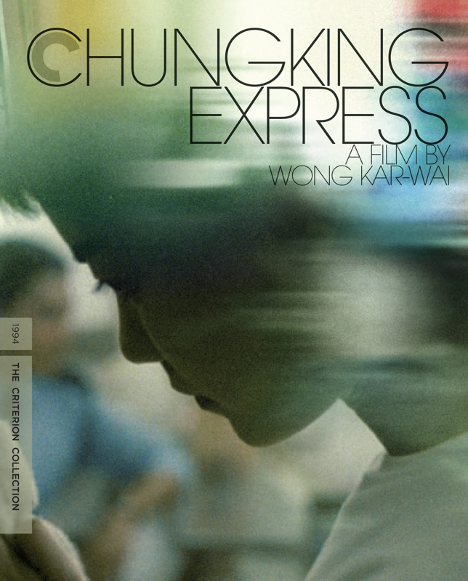Do I belong here? Students of color share their perspectives on living in Vermont
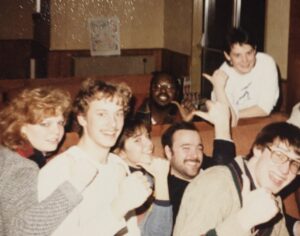
When Chrispin White came to Castleton in 1982, he was one of only about 11 Black students at Castleton. Coming from Virginia, it was a big change for him.
“I will be honest, I was able to navigate it pretty well from my standpoint. But there were a lot of situations that we had to deal with that were not pleasant,” White said.
One of these unpleasant situations occurred when he began dating a white girl from Vermont, whose parents were originally okay with the two being friends, but completely changed their tune when they found out that they were dating.
In another instance, White was speaking to a fellow student about a new freshman on the basketball team, a Black student from New York State. This student made comments questioning the freshman’s behavior, asking things like “what’s up with him? What’s wrong with him?” and saying that he “acts like he’s from the city.”
“I remember this like it was yesterday,” White said. “He made the comment ‘well, he’s in Vermont now, he should change.’”
Thinking back to 1982, a lot has changed. But some things have stayed the same, including the struggles students of color can face when they come to Castleton, said White who would stay in Vermont after graduation and have a long career at Castleton as the Director of The Center for Community Engagement.
White, who now works for the Chamber & Economic Development of the Rutland Region as Member Services and Events Manager, felt that his biggest asset as a Castleton staff member was being a person that prospective students and current students could speak to if they were feeling uncomfortable.
He even set a former student up with an internship that eventually led to a full-time job, though White made sure to express to the student that his own hard work is what brought him the job opportunity. And White still makes himself available to speak to students now.
“Even though I’m not an employee, I’m still connected to the campus and I’m an alum and a former employee. So, I’m always willing to have a conversation with anybody who wants a little advice or just needs somebody to talk to,” White said.
Especially now, as White thinks that “it’s more challenging for students nowadays than it was for us back in the ’80s.”
“There’s so many different divisive issues right now that play out on a college campus,” White said. “The awareness is heightened now to where back then, a lot of things weren’t talked about, a lot of things weren’t discussed, a lot of the things weren’t challenged. And it was almost like, you know, we dealt with the status quo because that’s the way it was.”
These days, White says, college students realize that they have a voice and don’t need to accept certain things just because that’s the way that they are.
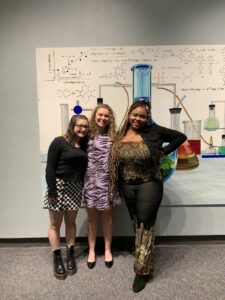
How different is it?
Sophomore Kayon Morgan is a Black student who was born in Jamaica and grew up in Port St. Lucie, Florida. Morgan describes herself as “outspoken,” which is clear when you see how unwavering she has been with her work as secretary of the NAACP at Castleton.
As White pointed out though, this outspokenness can be challenging.
“It was really hard for me when I didn’t know if other people would accept me. I didn’t know if people were gonna judge me,” said Morgan of her feelings when she first came to Vermont.
Both White and Morgan grew up well south of Vermont. White remembers when his older brothers were some of the first students in Virginia being bused to the all-white high school, and students there went up to the roof and threw rocks at them.
Morgan’s experience growing up in the South was very different, and coming to Vermont has been difficult for her because of how invisible racism is here.
“What I’ve realized with the South and the North is that the South is racist, yes, but it’s aggressive with its racism. So as an individual, I’ve learned that, hey, if I see this sign, if I see this flag, if I see this logo, I know that I’m not there… it was a lot easier for me to navigate that,” Morgan said. “In the North, it’s kind of this façade that, like, we’re integrated, that we’re better, and we’re progressive and everything, but… you can only put on this facade for so long.”
Morgan added that with how progressive the North seems to be, she didn’t expect to be going through the struggles that she has.
“Sometimes I just feel so unwelcomed, I feel like I don’t belong here. I feel like I’m not needed here, like, it’s so emotional for me because I feel like I try to do so much for the Castleton community and I try to impact it in so many ways,” Morgan said.
Graduate student Olu Sowunmi, who graduated from Castleton last May and is now pursuing his masters here, had a slightly different experience, but was still struck by the idea that he may be judged. Sowunmi grew up in the Bronx in New York City, his parents being immigrants from Nigeria.
“There would be times where I’d be the only Black person in that class. And it kinda made me feel uncomfortable,” Sowunmi said. “Sometimes I was kind of, like, scared to say something because I didn’t know how people would take my opinion. Just because I grew up differently than how a lot of people grew up, like having my parents from a different country, my thinking is just completely different, in a way, from a lot of my classmates so that was an internal conflict.”
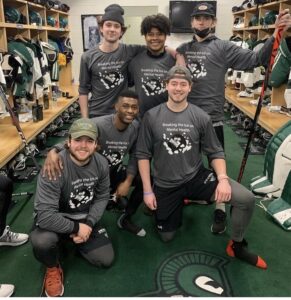
Jahwara Rennalls, a senior on the hockey team who grew up in what he describes as the kind of “cultural melting pot” of Ottawa, Canada, felt a bit of culture shock when coming to Vermont.
“I think there’s always that thought in the back of your head that you’re not sure how people will react when they see you walk into a room. Or just moving to a new place, you’re not sure how people are going to react to a Black person,” Rennalls said.
However, he added that coming here wasn’t a big concern.
“It was never a concern moving to Vermont with all the free thinking and everything like that here. I think Vermont’s probably one of the better states when it comes to that sort of thing,” he said.
Sowunmi also found that to be true.
“Even though it was uncomfortable, like, internally, I felt like everybody else was kind of accepting. No one ever really made me feel like I was different from them,” he said.
Acceptance through the team
Being on a sports team, which for Sowunmi was basketball, definitely has a positive impact on students of color’s experiences here, Black athletes said.
Saijon McIntosh, a senior on the Castleton football team, has had a very positive experience here, mostly due to his teammates.
“You come here by yourself originally, but as one week, two weeks go by you grow into a huge family, whichever team, so it’s like you’re not alone in college at all. And you always have new people coming in that you welcome into the family,” McIntosh said.
In fact, part of the reason he decided to come to Castleton was because of the amount of care and support he got.
“The way that these people here fought for me and, like, tried to help me out more than any other school did. It really influenced me to really sit down here and come to Vermont and let them help me,” McIntosh said.
Vermont, with its rural landscapes and small population, and much smaller population of people of color, isn’t seen as much of a destination for students of color.
According to Dean of Enrollment Maurice Ouimet, most of the university’s recruitment of students occurs in the Northeast region of the country, though admissions does branch out when interest is shown in other areas, or if alumni in other regions want to represent Castleton at college fairs.
“As far as the university recruitment efforts go, you know, it’s very general, and the events that we go to are really inclusive events,” Ouimet said.
And, while they don’t recruit students in any particular group or area, diversity, equity, and inclusion are important to the admissions team, especially as the transformation progresses.
“As we start our planning for Vermont State University and working with different populations of students, knowing that everything we do is viewed through the lens of DEI… those are all really important factors to consider going forward,” Ouimet said.
So what does bring students of color to Castleton?
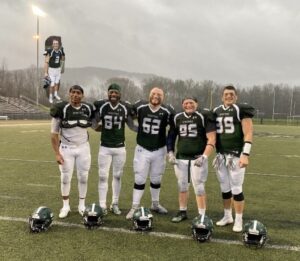
For White, and most of his teammates at the time, the opportunity to play basketball was the only thing that brought them here.
“Honestly, for a person of color to come to a location in Vermont, there has to be a reason, and for us that reason was athletics. If I didn’t come to Vermont to play basketball, I wouldn’t have come to Vermont,” White said, adding that for some students, this reason may not be athletics, but particular majors or opportunities.
According to McIntosh, it was definitely athletics that brought him to Vermont, proclaiming he “hates the cold … cannot stand it.”
“I definitely do think that like a lot of the other Black people or people of color are like that. They do come here for sports. Like, it’s not mainly because of what they teach or, like, for the weather or whatever. It’s mainly because they have a sport that they love. And they want to play no matter what,” McIntosh said.
On this, White, McIntosh, Sowunmi and Rennalls all agree.
“I really didn’t even know Vermont was a state before I got recruited,” Sowunmi said.
But diversity is increasing, slowly but surely, something that Rennalls has noticed in his four years here.
“For my first year, minority students were few and far between, but I think as the years have gone by, I’ve definitely seen an increase not just on the athletic teams, but just in the general student population, too,” Rennalls said.
Some come to make a difference
What brought Morgan to Castleton was a recommendation from her high school wrestling coach, who told her that her voice would be distinct in Vermont, that she would have the opportunity to make an impact and meet people she would never encounter in Florida. And this has been true for her.
“I’m able to bring a new perspective to this environment that’s never been here before. I’m able to contribute in such a rewarding manner,” Morgan said.
And even if she has doubts sometimes, she has no regrets about coming to Castleton.
“There are many things that are challenging about the environment. But I’m open to challenge, you know, I open the door for discussion. I am proud of my experience here. I’m proud of the growth that Castleton has shown,” Morgan said. “I’m really happy with the progress that’s coming in and I’m looking forward to even more progress.”

